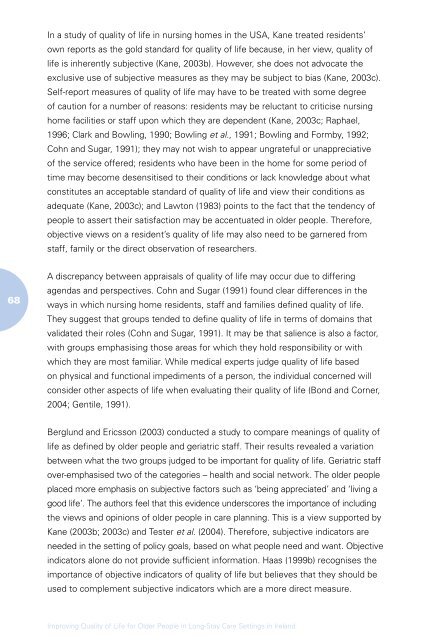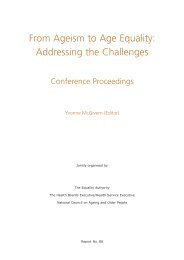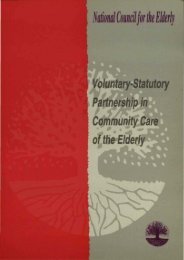Improving Quality of Life for Older People in Long-Stay Care ...
Improving Quality of Life for Older People in Long-Stay Care ...
Improving Quality of Life for Older People in Long-Stay Care ...
- No tags were found...
You also want an ePaper? Increase the reach of your titles
YUMPU automatically turns print PDFs into web optimized ePapers that Google loves.
In a study <strong>of</strong> quality <strong>of</strong> life <strong>in</strong> nurs<strong>in</strong>g homes <strong>in</strong> the USA, Kane treated residents’own reports as the gold standard <strong>for</strong> quality <strong>of</strong> life because, <strong>in</strong> her view, quality <strong>of</strong>life is <strong>in</strong>herently subjective (Kane, 2003b). However, she does not advocate theexclusive use <strong>of</strong> subjective measures as they may be subject to bias (Kane, 2003c).Self-report measures <strong>of</strong> quality <strong>of</strong> life may have to be treated with some degree<strong>of</strong> caution <strong>for</strong> a number <strong>of</strong> reasons: residents may be reluctant to criticise nurs<strong>in</strong>ghome facilities or staff upon which they are dependent (Kane, 2003c; Raphael,1996; Clark and Bowl<strong>in</strong>g, 1990; Bowl<strong>in</strong>g et al., 1991; Bowl<strong>in</strong>g and Formby, 1992;Cohn and Sugar, 1991); they may not wish to appear ungrateful or unappreciative<strong>of</strong> the service <strong>of</strong>fered; residents who have been <strong>in</strong> the home <strong>for</strong> some period <strong>of</strong>time may become desensitised to their conditions or lack knowledge about whatconstitutes an acceptable standard <strong>of</strong> quality <strong>of</strong> life and view their conditions asadequate (Kane, 2003c); and Lawton (1983) po<strong>in</strong>ts to the fact that the tendency <strong>of</strong>people to assert their satisfaction may be accentuated <strong>in</strong> older people. There<strong>for</strong>e,objective views on a resident’s quality <strong>of</strong> life may also need to be garnered fromstaff, family or the direct observation <strong>of</strong> researchers.68A discrepancy between appraisals <strong>of</strong> quality <strong>of</strong> life may occur due to differ<strong>in</strong>gagendas and perspectives. Cohn and Sugar (1991) found clear differences <strong>in</strong> theways <strong>in</strong> which nurs<strong>in</strong>g home residents, staff and families def<strong>in</strong>ed quality <strong>of</strong> life.They suggest that groups tended to def<strong>in</strong>e quality <strong>of</strong> life <strong>in</strong> terms <strong>of</strong> doma<strong>in</strong>s thatvalidated their roles (Cohn and Sugar, 1991). It may be that salience is also a factor,with groups emphasis<strong>in</strong>g those areas <strong>for</strong> which they hold responsibility or withwhich they are most familiar. While medical experts judge quality <strong>of</strong> life basedon physical and functional impediments <strong>of</strong> a person, the <strong>in</strong>dividual concerned willconsider other aspects <strong>of</strong> life when evaluat<strong>in</strong>g their quality <strong>of</strong> life (Bond and Corner,2004; Gentile, 1991).Berglund and Ericsson (2003) conducted a study to compare mean<strong>in</strong>gs <strong>of</strong> quality <strong>of</strong>life as def<strong>in</strong>ed by older people and geriatric staff. Their results revealed a variationbetween what the two groups judged to be important <strong>for</strong> quality <strong>of</strong> life. Geriatric staffover-emphasised two <strong>of</strong> the categories – health and social network. The older peopleplaced more emphasis on subjective factors such as ‘be<strong>in</strong>g appreciated’ and ‘liv<strong>in</strong>g agood life’. The authors feel that this evidence underscores the importance <strong>of</strong> <strong>in</strong>clud<strong>in</strong>gthe views and op<strong>in</strong>ions <strong>of</strong> older people <strong>in</strong> care plann<strong>in</strong>g. This is a view supported byKane (2003b; 2003c) and Tester et al. (2004). There<strong>for</strong>e, subjective <strong>in</strong>dicators areneeded <strong>in</strong> the sett<strong>in</strong>g <strong>of</strong> policy goals, based on what people need and want. Objective<strong>in</strong>dicators alone do not provide sufficient <strong>in</strong><strong>for</strong>mation. Haas (1999b) recognises theimportance <strong>of</strong> objective <strong>in</strong>dicators <strong>of</strong> quality <strong>of</strong> life but believes that they should beused to complement subjective <strong>in</strong>dicators which are a more direct measure.<strong>Improv<strong>in</strong>g</strong> <strong>Quality</strong> <strong>of</strong> <strong>Life</strong> <strong>for</strong> <strong>Older</strong> <strong>People</strong> <strong>in</strong> <strong>Long</strong>-<strong>Stay</strong> <strong>Care</strong> Sett<strong>in</strong>gs <strong>in</strong> Ireland















